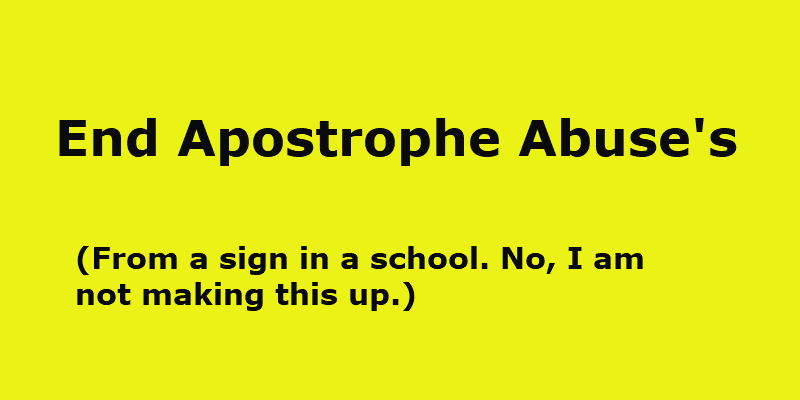
By Joe Diorio
As the holidays fade into memory it is again time to shine the Festivus spotlight on those quirks of grammar that either drive us all crazy or disappoint us to no end. It has been quite a year.
The Apostrophe Protection Society lives!
Speaking of has-beens, my email runneth over with news from readers about the demise of the Apostrophe Protection Society (APS), which shut itself down in the fourth quarter of 2019.
The APS was created in 2001 by a retired journalist in the United Kingdom named John Richards to, as he explains, “defend the much-abused punctuation mark.” For 18 years Richards would wage war – no, I don’t know how – against usage like “apples’s for sale,” or “ladies fashions.” But Richards at age 96 said the war is over.
“When I first set it up, I would get about 40 emails or letters a week from people all over the world,” he told the BBC. “[N]owadays I hardly get anything.”
But shortly after Richards’s (yes, “Richards’s.” That’s how you use an apostrophe to make a name that ends in “s” possessive) post the APS website had a 600-fold increase in traffic. “The APS website is NOT closing down!” says a message on the APS website. Not sure if it is Richards saying that, but for sure reports of the death of the Apostrophe Protection Society are, to quote Mark Twain, greatly misquoted.
We should never give in to bad grammar, even if a 96-year-old man says he’s throwing in the towel. There are grammatical practices or phrases that should go away forever. The proper use of the apostrophe isn’t one of them.
Stop taking the gloves off
One quirk of our language that should go away, and to fight it I am taking off the gloves, is the use of the phrase “taking off the gloves” in political reportage.
To be polite, it’s overused. “Clinton escalates her smear campaign; Sanders takes the gloves off,” “Donald Trump is taking off the gloves,” “The Clintons are taking off the gloves,” “Hillary Clinton and Donald Trump are taking off the gloves” are a handful of headlines from the 2016 presidential campaign.
To be impolite, it’s as though there is one key on every political reporter’s PC that spews out that line with a single keystroke. A Lexus Uni search by my colleague Melissa Mallon at Vanderbilt University uncovered scores of times the phrase was used during the 2016 presidential campaign.
The term is a colloquialism, used to indicate that someone has decided to stop being the nice guy in a political fight. Its first usage appears to have been in The Nottingham Guardian from April 20, 1866 when it reported, “[T]he gentleman who came to show the excited state of the town was obliged to admit that on the 26th of June he used to the excited people of the town the expression about taking off the gloves and breaking the buttons from the foils.”
I have chided writers in the past for a lack of creativity in social media posts (“I’m proud to be …”, “I’m excited to be …”, “So honored to …”, please make it stop.). Let me offer the same admonition to those covering the 2020 presidential campaign; there are other terms you can use.
- “They are no longer nice, as if they ever were.”
- “If voters thought it was nasty before, they ain’t seen nothing yet.”
- “Nasty comments abound on the campaign trail.”
- “Covfefe” (OK, not that one. But it WAS only used once!)
Did it hurt less than a collision?
Carnival Cruise Lines is calling the December 20 accident between two of its cruise ships in Cozumel, Mexico an “allision” because only one of the giant ships was moving at the time of the snafu. Merriam Webster agrees, pointing out it the word is used almost exclusively when one ship bumps into a stationary vessel. As Johnny Depp’s character, Captain Jack Sparrow, would say, it’s a nautical term.
Illegal procedure on apologies
Myles Garrett is a defensive lineman for the Cleveland Browns of the National Football League (NFL) who made dubious news on November 14 this past year when, during a game, he ripped the helmet off of the head of Pittsburgh Steelers quarterback Mason Rudolph and hit Rudolph in the head with said helmet.
Garrett received a hefty fine and long suspension from the NFL for his action. He also said “I would like to apologize” for the incident. Not to kick a man when he’s down – which is a 15-yard personal foul penalty in the NFL – but is that “Jeopardy” music I hear or did Garrett actually mean to just say, “I apologize?”
Let’s write carefully out there, people.
Joe Diorio is a Nashville-based writer. He’d like to know what your Festivus grievances of grammar are.
Hi. Trying to subscribe to your newsletter. Coming to a lot of dead ends, unless this is the way to do it. And, no, I’m not a caribou.
LikeLike
Ros, sorry! Here is the link:
https://visitor.r20.constantcontact.com/manage/optin?v=0018eu2C0rirO2XDkzU13iEqP7Ruc4Tar_xSqbZoc-0WcCN9REfvwUEPet1bXVVRsUKcm4UKJS87x9-XimOKIOYutME2HBX29dCZfJBHqKpF0WP_eflz1EBnrjYc2G-eg2329dkkT5rforCaSrC1AFZSdnqU_pwOg36OgCdvI1dHj7ymAV_9yBmcNj7qlWWxSqP272BTgJAPAQdh9xW6I66aZlc0FUybKmtzDyZB0HJhlE%3D
Sorry that it is so long. I need to go in and fix the broken links on the blog. Ugh!
LikeLike